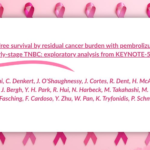
Clear cell renal cell carcinoma (ccRCC) is closely associated with dysregulation of the VHL pathway, leading to the overexpression of HIF-2α and activation of multiple oncogenic pathways. Targeting HIF-2α with therapies such as belzutifan has provided new hope for patients with VHL syndrome and even broader applications in kidney cancer treatment. At this year’s ASCO Genitourinary Cancers Symposium (ASCO GU), Urology Frontier invited Dr. Kan Gong from Peking University First Hospital to discuss with Dr. Eric Jonasch, Director of the VHL Clinical Center at MD Anderson Cancer Center, the patient populations benefiting from belzutifan, management of adverse effects, and its future clinical applications.Urology Frontier: Belzutifan was FDA-approved for VHL-associated disease in 2021. Could you share your clinical experience? At what stage of disease progression do you typically recommend belzutifan, and how do you manage common adverse events such as anemia and fatigue?
Dr. Eric Jonasch: For patients with VHL syndrome, our approach depends on whether they are at risk of developing multiple threatening lesions that require intervention. Key factors include kidney tumors ≥3 cm, the potential presence of central nervous system hemangioblastomas, or pancreatic neuroendocrine tumors.
If a patient has only a single lesion (e.g., a localized kidney tumor), ablative therapies or surgery can often provide effective treatment without the need for additional interventions, and in these cases, we do not recommend belzutifan. However, for patients with multiple lesions that may impact survival or lead to repeated surgeries, we typically consider belzutifan as a treatment option.
When prescribing belzutifan, we carefully monitor and manage adverse effects. The most common adverse event (AE) observed is anemia. This occurs because HIF-2α regulates erythropoietin (EPO) production by binding to oxygen-dependent transcriptional regulatory elements in the EPO gene. Since belzutifan inhibits HIF-2α, it suppresses EPO transcription, leading to anemia. In clinical practice, we often use erythropoiesis-stimulating agents (ESAs) to maintain hemoglobin levels.
The second most frequently observed AE is hypoxia. In young patients with VHL syndrome, this is rarely an issue. However, in older patients with VHL disease and those with advanced kidney cancer, hypoxia can occur. We monitor patients closely and recommend regular pulse oximetry assessments. If blood oxygen saturation drops below 90%, we temporarily discontinue treatment. Once oxygen saturation exceeds 92%, we resume treatment at a reduced dose.
The third notable adverse event is fatigue. In most cases, we manage this by adjusting the dosage of belzutifan to improve tolerability.
Urology Frontier: Why does belzutifan show limited efficacy in patients with pheochromocytoma and paraganglioma (PPGL)?
Dr. Eric Jonasch: We have also observed this phenomenon, but our experience with the diagnosis and treatment of PPGL is relatively limited, and we have not yet conducted in-depth research on this issue.
Dr. Kan Gong: Data from VHL patients in China suggest that belzutifan does not demonstrate significant efficacy in treating PPGL. However, in VHL-associated renal cancer patients, its efficacy is quite remarkable.
Dr. Eric Jonasch: Are all these PPGL cases related to VHL? This observation is very interesting.
Dr. Kan Gong: Yes, which is why our team has collected PPGL-related data and is analyzing the underlying reasons. We aim to understand why belzutifan performs poorly in PPGL patients.
Dr. Eric Jonasch: It is possible that additional mutations beyond VHL are involved, collectively shaping the disease’s biological characteristics. This is a very intriguing question and certainly warrants further investigation.
Urology Frontier: Belzutifan has achieved groundbreaking progress in the treatment of advanced clear cell renal cell carcinoma (ccRCC), as evidenced by the Phase III clinical study published in NEJM in 2024. What are your perspectives on its future applications?
Dr. Kan Gong: This is a critical question. In the field of advanced kidney cancer treatment, we now have a wide array of therapeutic options. Both the European Association of Urology (EAU) and the American Urological Association (AUA) have established well-recognized guidelines for first-line, second-line, and later-line treatments. Clinical practice has also accumulated substantial experience in treating both clear cell and non-clear cell renal carcinoma.
However, based on current data, belzutifan has demonstrated remarkable efficacy in treating advanced ccRCC. I believe it will usher in a new era in advanced kidney cancer treatment. Although current guidelines may list it as a second-line treatment, I expect its role will become more prominent as clinical experience accumulates and additional data confirm its benefits.
Data from the LITESPARK-015 study in China further reinforce the promise of belzutifan. Regarding safety, common adverse effects such as anemia, fatigue, and hypoxia remain manageable. Given these factors, a multidisciplinary treatment (MDT) approach, involving collaboration between oncologists and internists, is crucial to ensuring optimal patient management. I firmly believe that belzutifan has the potential to become a powerful therapeutic option for advanced kidney cancer in the future.
As for whether combining belzutifan with immunotherapy will emerge as the next treatment paradigm, further exploration and validation are needed. This is a topic I have discussed extensively with Dr. Eric Jonasch. Our institutions are planning collaborative research to explore new breakthroughs in this area.
Dr. Eric Jonasch: The FDA’s approval of belzutifan for advanced renal cell carcinoma (RCC) is a major milestone for patients. The LITESPARK-005 study enrolled patients previously treated with immune checkpoint inhibitors combined with tyrosine kinase inhibitors (TKIs), with a median of two prior treatment lines. The study reported an objective response rate (ORR) of approximately 23% and a disease progression rate of 34%, indicating that while some patients benefit from belzutifan, others do not experience significant improvement. Notably, some patients achieved durable responses lasting nearly two years, with good treatment tolerance. These findings suggest that belzutifan could serve as a monotherapy option for patients with advanced RCC who have failed prior treatments.
However, the question of whether belzutifan should be used in earlier-stage disease or in combination with other therapies remains a topic of debate. Data from the LITESPARK-003 study showed that combining belzutifan with cabozantinib in treatment-naïve patients resulted in an ORR of approximately 70%, with a progression-free survival (PFS) nearing 30 months. This suggests that combination therapy is a viable strategy.
Additionally, we are conducting multiple studies to evaluate the efficacy of belzutifan in combination with immunotherapy or immunotherapy plus TKI therapy. However, the data from these studies are not yet mature. For example, the LITESPARK-011 trial is investigating belzutifan in combination with lenvatinib and pembrolizumab, and we eagerly await the results.
Preliminary data from belzutifan combined with immunotherapy suggest that while some patients benefit, the PFS improvement is not necessarily superior to TKI combinations, and the synergistic effect appears to be relatively limited. Moving forward, we need to further explore belzutifan’s mechanisms of action, determine the optimal disease settings for its use, and identify the most effective drug combinations. Over the next few years, I anticipate that these questions will be gradually answered, paving the way for new treatment strategies in advanced renal cell carcinoma.
About Dr. Kan Gong
- Professor, PhD Supervisor, Chief Physician
- Deputy Director, Institute of Urology, Peking University
- Deputy Director, Tumor Translational Center, Peking University First Hospital
- Director, Scientific Research, Peking University First Hospital
- National High-Level Talent Special Support Program (Ten-Thousand Talents Program)
- Leading Talent in Science and Technology Innovation, Ministry of Science and Technology
- Outstanding Talent of the New Century, Ministry of Education
- Member, Tumor Group, Chinese Urological Association (CUA)
- Deputy Leader, Translational Medicine Group, Chinese Urological Association (CUA)
- Member, First Committee on Rare Diseases, Chinese Medical Association
- Vice Chairman, Urology Branch, China Medical Promotion Association
- Head, Genetics and Rare Diseases Collaborative Group, Chinese Urological Association
- Member, Urological Oncology Committee, Chinese Medical Doctor Association
- Standing Member, Hereditary Tumor Committee, Chinese Anti-Cancer Association
- Executive Council Member, Rare Disease Branch, Chinese Research Hospital Association
- Standing Member, Oncology Committee, Beijing Medical Association
- Standing Member, Rare Disease Committee, Beijing Medical Association
- Advisory Member, International VHL Alliance
Professor Gong has been dedicated to the diagnosis, prevention, and treatment of rare and complex urological tumors. He has led over 20 major national projects, including key initiatives from the Ministry of Science and Technology and the National Natural Science Foundation. His research has been published in top-tier journals such as Cancer Discovery, PNAS, and Cancer Research, with over 100 SCI-indexed papers. He holds three granted patents, one of which has successfully been commercialized.
About Dr. Eric Jonasch
- Director, VHL Clinical Center, MD Anderson Cancer Center
- Professor, Department of Genitourinary Medical Oncology, MD Anderson Cancer Center
- Co-Director, Kidney Cancer Research Program, MD Anderson Cancer Center
- Specializes in translational research on renal cell carcinoma and VHL disease
- Leads multiple investigator-initiated clinical trials evaluating targeted therapy responses and resistance mechanisms
- Member of the American Association for Cancer Research (AACR) and American Society of Clinical Oncology (ASCO)
- Vice Chair, NCCN Kidney Cancer Panel


